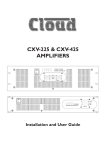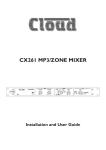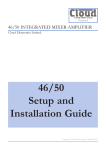Download Cloud MPA SERIES User guide
Transcript
MPA SERIES MIXER-AMPLIFIER Installation and User Guide Contents Safety Information......................................... 4 Safety Notes regarding Installation......................... 4 Conformities................................................... 4 Safety Considerations and Information................. 4 Caution - High Voltages............................................. 4 Caution - Mains Fuse................................................. 4 Caution - Servicing..................................................... 4 General Description....................................... 5 General Notes.............................................. 11 Multi-zone Applications...........................................11 EMC Considerations................................................11 Earthing.......................................................................11 Ventilation...................................................................11 Technical Specifications............................... 12 Location of internal jumpers, etc................ 13 Factory Default Jumper Settings............................13 Schematic Diagram....................................... 5 Front Panel Description................................ 6 Rear Panel Description.................................. 6 Music Inputs.................................................... 7 Sensitivity & Gain Control........................................ 7 Music Source Select................................................... 7 Music Level Control................................................... 7 Remote Control of Music Source ......................... 7 Select and Level........................................................... 7 Music Equalisation.......................................... 8 Music Priority................................................. 8 Microphone Inputs......................................... 8 Gain Control................................................................ 8 Microphone Access Input.......................................... 8 Front Panel Microphone Level Controls...... 8 Microphone Equalisation............................... 8 Microphone Priority....................................... 9 Microphone over music priority............................. 9 Mic 1 over Mics 2-4 priority.................................... 9 Chime.............................................................. 9 Power Amplifier Stage and Outputs............ 9 Low impedance operation........................................ 9 Line Output.................................................................. 9 High pass filter...........................................................10 Music Mute(Fire Alarm Interface).............. 10 Bose® Equalisation Modules ...................... 10 Installation Instructions...........................................10 MPA Series User Manual v1.1 3 Safety Information Safety Considerations and Information Safety Notes regarding Installation The unit must be earthed. Ensure that the mains power supply provides an effective earth connection using a threewire termination. •• Do not expose the unit to water or moisture. •• Do not expose the unit to naked flames. •• Do not block or restrict any air vent. •• Do not operate the unit in ambient temperatures above 35OC. •• Do not touch any part or terminal carrying the hazardous live symbol ( the unit. ) while power is supplied to •• Do not perform any internal adjustments unless you are qualified to do so and fully understand the hazards associated with mains-operated equipment. •• The unit has no user-serviceable parts. Refer servicing to qualified service personnel. •• If the moulded plug is cut off the mains lead for any reason, the discarded plug is a potential hazard and should be disposed of in a responsible manner. For more detailed information refer to the rear of the manual. Safety Notes When the mains switch is in the off ‘O’ position the live and neutral conductors of the mains transformer are disconnected. Caution - High Voltages Do not touch any part or terminal carrying the hazardous live symbol ( ) while power is supplied to the unit. Terminals to which the hazardous live symbol refers require installation by a qualified person. Caution - Mains Fuse Replace the mains fuse only with the same type and rating as marked on the rear panel. The fuse body size is 20mm x 5mm. Caution - Servicing The unit contains no user serviceable parts. Refer servicing to qualified service personnel. Do not perform servicing unless you are qualified to do so. Disconnect the power cable from the unit before removing the top panel and do not make any internal adjustments with the unit switched on. Conformities This product conforms to the following European EMC Standards: BS EN 55103-1:1997 BS EN 55103-2:1997 This product has been tested for use in commercial and light industrial environments. If the unit is used in controlled EMC environments, the urban outdoors, heavy industrial environments or close to railways, transmitters, overhead power lines, etc., the performance of the unit may be degraded. The product conforms to the following European electrical safety standard: BS EN 60065:2002 The MPA Series was developed and manufactured with high quality materials and components, which can be recycled and/or reused. The WEEE symbol indicates that electrical and electronic equipment must be disposed of separately from normal waste at the end of its operational lifetime. Please dispose of this product by taking it to your local collection point or recycling centre. 4 MPA Series User Manual v1.1 Only reassemble the unit using bolts/screws identical to the original parts. General Description The Cloud MPA Series is a range of mixer-amplifiers with applications in Licensed, Retail, Leisure and similar venues. Three models are available to suit different output power requirements (60, 120 or 240 watts); otherwise all models have identical facilities. The mixer-amplifiers have inputs for six stereo line signals and four microphone signals. Front panel controls are provided for music source selection, music level and microphone levels. All pre-set controls are located on the rear panel with further configuration jumpers mounted on the main PCB. A remote level control or combined level control/music source selector can be wired to the unit for installations that require remote control. Schematic Diagram fig.1: MPA Series Schematic Diagram MPA Series User Manual v1.1 5 5 6 7 7 4 MAINS O I 5 L6 L5 L2 7 9 2 L1 fig.2: MPA Front Panel 5 6 4 10 1 7 6 5 8 9 3 2 PEAK OFF 7 8 3 10 1 MUSIC MUTE 6 5 4 8 3 L3 POWER 6 4 L4 7 4 9 3 2 OFF LEVEL 10 1 5 8 6 4 2 10 1 OFF LEVEL 9 2 10 1 OFF LEVEL 7 8 9 3 OFF LEVEL 1 2 3 1 MIC LEVEL 1 to 4 - level controls for Mic Inputs 1 to 4 4 PEAK – illuminates if Mic or Line signals level are too high 2 MUSIC SOURCE – selects active Line Input (1 to 6) 5 MUSIC MUTE – illuminates when external Emergency Mute is active 3 MUSIC LEVEL – adjusts level of selected Line Input 6 MAINS – AC power switch with LED 7 Ventilation slots – forced-air cooling air intake Front Panel Description 1 2 15 6 7 9 3 10 12 11 13 8 14 5 4 fig.3: MPA Rear Panel Rear Panel Description 6 1 LINE 1 to LINE 6 – stereo line inputs for music sources 9 LINE OUTPUT – for connection of 100 V/ 70 V/25 V line distribution system 2 GAIN 1 to GAIN 6 – level trims for each line input 10 3 MUSIC EQ – LF and HF EQ adjustment for music channel MUSIC MUTE – Emergency control input for muting music source 11 REMOTE MUSIC CONTROL – for connection of RL-1 or RSL-6 remote control panels 12 REMOTE/LOCAL – disables front panel controls when remote control is in use 13 IEC mains input 14 Mains fuse 15 Fan – forced-air cooling air exhaust 4 MIC 1 to MIC 4 – balanced mic inputs 5 GAIN 1 to GAIN 4 – level trims for each mic input 6 MIC EQ – LF and HF EQ adjustment for mic channel 7 ACCESS – external paging control input for Mic 1 8 LOW IMPEDANCE OUTPUT – speaker output for low-Z connection MPA Series User Manual v1.1 Music Inputs Music Level Control The unit has six stereo line inputs; these inputs are suitable for most music sources such as compact disc players, tape players, satellite receivers and the like. Each stereo input is summed internally to mono. All inputs are unbalanced and use RCA phono sockets. The input impedance is 47k ohm. Line 6 input can be configured to have priority over any other music source, see Music Priority, page 8. Sensitivity & Gain Control All six stereo line inputs have a preset gain control on the rear panel adjacent to the respective input sockets. The gain control has a range of 20 dB allowing the input sensitivity to be varied from -12 dBu (200 mV) to +8 dBu (2.0 V). The preset gain control should be adjusted so that all the input signals are operating at the same level and that the front panel level control has an optimum range of control. Music Source Select This front panel six position switch is used to select the desired music signal. Remote control of source selection is possible with a remote control plate (RSL-6), See fig.4. A front panel mounted music level control is provided. Remote control of music level is possible by connecting a remote control plate (either RSL-6 or RL-1), See fig.4. Remote Control of Music Source Select and Level The MPA Series mixer-amplifiers are compatible with standard Cloud remote control plates Types RSL-6 (music source select and level) and RL-1 (level only). Either type of plate may be connected at the rear 3-pin 5 mm-pitch screw terminal connector (Remote Music Control), using the wiring shown in fig.4. Use two-core (RSL-6 or RL-1) or single-core (RL-1 only) screened cable to connect the remote level plate (max length 100 metres). Pressing the button adjacent to the rear panel connector activates the remote control plate and disables both the front panel level and source select controls. If an RL-1 is being used, the internal jumper J4 should be moved from its default ‘SW’ setting to ‘FR’, to override the disabling of the front panel source select switch. See fig.7 for location of jumpers. REMOTE LEVEL CONTROL WIRING REMOTE SOURCE & LEVEL CONTROL WIRING REMOTE MUSIC CONTROL CONNECTOR RL-1 1 2 REMOTE MUSIC CONTROL CONNECTOR 3 RSL-6 1 2 1 3 2 1 3 SINGLE-CORE SCREENED CABLE MAY BE USED 2 3 USE TWO-CORE SCREENED CABLE fig.4: RL-1 and RSL-6 Wiring MIC INPUTS 1 2 PIN 1: SCREEN (GROUND) PIN 2: COLD/ANTIPHASE (-) PIN 3: HOT/PHASE (+) 3 + 1 2 3 SCN SCN + BALANCED CONNECTION UNBALANCED CONNECTION fig.5: Microphone Input Wiring MPA Series User Manual v1.1 7 Music Equalisation Microphone Access Input One set of independent bass and treble controls is provided for the music signals. These preset controls are located on the rear panel below the line input sockets. The treble control has a range of ±10 dB at 10 kHz and the bass control has a range of ±10 dB at 50 Hz. Mic input 1 is equipped with an external access control input; this is a 2-pin 5 mm-pitch screw terminal connector adjacent to the Mic input 1 connector. The access input is primarily intended to provide compatibility with paging microphones and their associated switching arrangements. By default, the access function is bypassed. Music Priority A Juke Box, Digital Sound Store or other audio source can be given automatic priority over all other music inputs by connecting it to Line 6 input and moving internal jumpers 5A and 5B from the OFF position (factory default) to the ON. When this mode of operation is selected, the unit will operate normally until a signal is detected on Line 6, when the selected source (usually background music) is muted, allowing the source connected to Line 6 to replace it. Once the signal on line 6 stops, the selected source will smoothly restore to its former level. The time taken for the restoration is set in the factory at 3 seconds, but it may be set at 6 or 12 seconds with internal jumper J7. (3s is suitable for announcements, but the longer times may be more appropriate when a jukebox or similar is the Line 6 source.) See fig.7 for location of jumpers. Microphone Inputs Four microphone inputs are provided; the microphone preamplifiers are an electronically balanced, transformer-less design configured for optimum low noise performance. The input impedance is greater than 2 kΩ and is suitable for microphones in the 200 Ω to 600 Ω range. Inputs are via 3-pin 3.5 mm-pitch screw terminal connectors on the rear panel. Connect microphones as shown in fig.5. Note that if using an unbalanced microphone, pins 1 and 2 should be connected together. Phantom power is available on any or all of the mic inputs, and is activated by setting internal jumpers J9 to J12 (for mic inputs 1 to 4 respectively) to the ON position. See fig.7 for location of jumpers. Care should be taken to ensure that phantom power is activated only when the microphone connected to the input requires external phantom power; damage to the microphone may result otherwise. Gain Control A mic gain control (of the preset type) is provided adjacent to each input connector. The gain can be adjusted from 10 dB to 50 dB. A high overload margin is maintained at all gain settings. 8 MPA Series User Manual v1.1 To use the function, it must be enabled by moving internal jumper J13 from its default ON setting to OFF. See fig.7 for location of jumpers. Once enabled, the microphone input is muted while the pins of the access connector are opencircuit. When the pins are connected together, Mic input 1 becomes active for use. The access input can also trigger the following functions: • Mic 1 Priority over Mics 2-4 Activation of Mic 1 via the access input will give Mic 1 priority over Mics 2, 3 and 4 if internal jumper J8 is set to ON. See fig.7 for location of jumpers. See also Mic 1 over Mics 2-4 priority, page 9. • Chime The internal chime generator will be activated if internal jumper J1 is set to ON. See fig.7 for location of jumpers. See also Chime, page 9. Front Panel Microphone Level Controls A separate level control is provided for each mic input and these provide the user with a convenient means of adjusting the audio level of the microphones. The microphone signals are routed directly to the power stage and are unaffected by the operation of the music level control. The gain controls on the rear panel (see Gain Control) should be set at a level where microphone distortion does not occur even when the front panel level controls are fully clockwise. Microphone Equalisation The four microphone inputs are summed together and are routed to the power stage via a fixed high pass filter and an adjustable EQ section. The fixed filter attenuates the signal below 100 Hz, which helps to reduce the effects of microphone handling noise. The two preset EQ controls are on the rear panel adjacent to the mic inputs; the LF and HF controls provide ±10 dB of adjustment below 100 Hz and above 5 kHz respectively. After installation, some test announcements should be made, ideally by the people who will normally make them. The Mic EQ should be adjusted if necessary to maximise voice clarity. Microphone Priority MPA Series mixer-amplifiers provide two separate microphone priority functions. One of these enables the microphones to have priority over music, the other allows Mic 1 to have priority over the other microphones. Microphone over music priority Fully automatic voice operated priority (VOX function) is available for the microphone signals. This function is enabled by internal jumper J6 (default setting is ON). When enabled, the music signal is automatically attenuated by 30 dB when a microphone signal is detected, allowing the message to be clearly heard. Normal music operation is restored smoothly after the announcement ends. Note that the presence of a signal on any of the four mic inputs will operate this function. Mic 1 over Mics 2-4 priority If internal jumper J8 is set to ON (the default setting is OFF), Mic inputs 2, 3 and 4 will be muted whenever the Microphone Access Input is enabled. This ensures that Mic 1 will always have priority over any other microphones in use when Mic 1 is used for paging. Note that if jumper J13 is left at its default setting of ON, Mics 2, 3 and 4 will be permanently disabled by this function, leaving Mic 1 as the only active microphone input. Chime The MPA Series amplifiers have an internal preannouncement chime generator. The chime is triggered by the Microphone Access Input, if enabled by jumper J1 being set to ON. J1’s default setting is OFF. An internal preset rotary control is provided to adjust the chime volume; the front panel level controls have no effect on the chime level. See fig.7 for locations of internal controls. Power Amplifier Stage and Outputs Low impedance operation The MPA Series amplifiers are able to deliver their rated power into a 4 ohm load, as follows: MPA60 Model Rated Power 60 watts MPA120 120 watts MPA240 240 watts The maximum output power will be reduced with higher load impedances. When using multiple low-impedance loudspeakers (normally 8 ohms) with a single amplifier, series and/or parallel wiring should be employed to produce a total load impedance of not less than 4 ohms. The low impedance output is available on a 2-pin 5 mm-pitch screw terminal connector on the rear panel. Note that one of the output pins is connected internally to 0 V. Line Output MPA Series amplifiers are fitted as standard with an output transformer that can be enabled by moving an internal connector. The transformer should be placed in circuit if the amplifier is to be used with a 100 V, 70 V or 25 V line speaker distribution system. To convert the amplifier to high-voltage line operation, the low impedance output socket should be unplugged from CON8 on the main pcb (a short pair of heavy red and black wires), and replaced by the spare plug connected to the toroidal transformer nearer the rear of the unit (same wire types). Note that the low-impedance output will no longer be available once the transformer is plugged in. The secondary (output side) of the transformer is permanently wired to the line output connector (a 4-pin 5 mm-pitch screw terminal type), thus the high-voltage output will be active once the internal connector change has been made. A safety cover is fitted over the connector, which may be removed to connect the speaker cable. Replace the cover after the connection has been made. The transformer secondary has 3 line outputs: 100 V, 70 V and 25 V; whilst these have a common 0 V connection, the output is fully floating i.e. it is isolated from the rest of the amplifier. When the transformer is in use the maximum total combined load should not exceed the rated power for the amplifier model (see table above). MPA Series User Manual v1.1 9 When this transformer is in circuit it is strongly recommended that the amplifier’s 65 Hz high pass filter is set ON (see section below: High pass filter). High pass filter A high pass filter is provided to protect speakers, transformers etc. from the effects of low frequency signals. The filter is enabled by the internal jumper J2 (see fig.7). The filter reduces the output level of frequencies below 65 Hz, and ideally should be used if the line output transformer is in circuit. Bose® Equalisation Modules MPA Series amplifiers are compatible with single channel Bose® Series II equalisation modules. EQ modules are available to suit the following Bose® loudspeakers: • Panaray MA12 • Panaray 402-II, 502B and 502BEX • Panaray LT Series: Models 3302, 4402, 9402 and 9702. Modules to suit other models are available – please enquire. Installation Instructions Music Mute (Fire Alarm Interface) Refer to the pcb layout diagram (see fig.7) for the location of the Bose EQ module connector and its associated bypass jumper J3. In some installations (such as licensed premises or retail outlets within a shopping mall), there may be a local authority or fire service requirement to mute the music signals from a fire alarm control panel when an alarm condition arises. The MPA Series amplifiers include a facility to mute the music signals only (i.e., mic inputs are still active), via the Music Mute input. This is a 2-pin 5 mmpitch screw terminal connector on the rear panel, and the contacts are fully isolated. Activation of the Music Mute is often via a relay mounted close to the MPA Series amplifier, powered by the fire alarm control panel. Other arrangements may exist depending on the design of the fire control system and the fire alarm installation company should be consulted when making the connection. The MPA Series amplifiers will mute on either a contact closure at the Music Mute input (NO) or an opencircuit (NC). Selection of NO or NC operation is made with internal jumper J14. NO is the factory default. See fig.6. To install an EQ module, proceed as follows: 1. Switch off the power and isolate the unit from the mains. 2. Remove the top panel. 3. Remove jumper J3 from the main pcb. 4. Plug the Bose® equalisation module onto its connector; note that the connector has two notches on one side which engage with lugs on the module’s mating connector to ensure correct orientation. 5. Replace the top panel. REMOTE MUSIC MUTE TERMINATIONS MUSIC MUTE INPUT 1 fig.6: Remote Music Mute 10 MPA Series User Manual v1.1 2 1 RELAY RELAY NORMALLY OPEN (NO) CONNECTION MUSIC MUTE INPUT NORMALLY CLOSED (NC) CONNECTION 2 General Notes Earthing Multi-zone Applications When several mains powered units are connected together via their signal cables, there is a risk of one or more earth loops which may cause an audible hum on the system even with the gain controls set to minimum. Where the sound system specification calls for separate control in several zones, MPA Series amplifiers can be used in multiples. Signal sources can be connected to several inputs as required, but care must be taken to ensure the output stage of the signal source is capable of driving the resulting lower input impedance. The impedance of the line inputs (music inputs) is 47k ohms and it is reasonable to assume that most op-amp based signal sources are able to drive a 10k ohm load, allowing up to five amplifiers to be paralleled. The input impedance of the mic inputs is 2.4k ohms, making them suitable for microphones with a nominal impedance of 600 ohms or less. A single 600 ohm microphone could therefore typically be connected to four paralleled mic inputs. If this guideline figure cannot be adhered to, the use of suitable mic or line distribution amplifiers is recommended. To avoid any problems associated with differences in mains supply earthing, we recommend that all MPA Series amplifiers used in a multi-zone application should be colocated and connected to a common mains supply. Note that when using multiple MPA Series amplifiers in a 19” rack, suitable ventilation arrangements must be made to ensure that lower amplifiers do not cause those above to overheat (see Ventilation for further information). EMC Considerations MPA Series amplifiers fully conform to the relevant electromagnetic compatibility (EMC) standards and are technically well behaved.You should experience no problems interfacing units to other items of equipment and under normal circumstances, no special precautions need to be taken. If the unit is to be used in close proximity to potential sources of HF disturbance such as high power communication transmitters, radar stations and the like, it is suggested that input signal leads be kept as short as possible. Always use balanced interconnections wherever possible. If the MPA Series amplifier is mounted in a 19” rack, do not locate the unit in close proximity to a powerful amplifier of any kind, which may radiate a strong magnetic field from the power transformer. The 0 V rail of an MPA Series amplifier is directly coupled to the chassis ground. No interconnection problems should be encountered, but if there is any hum or other extraneous noise when source equipment is connected, the situation can generally be remedied by observing the following guidelines: • Always connect sources using balanced connections wherever possible, with the cable screen only connected at the receiving end (amplifier input). • Use audio isolating transformers (readily available from trade suppliers) at the inputs if necessary. These will ensure that the amplifier is electrically isolated from the source equipment. • The signal source units should be located as close as possible to the amplifiers and the metal housing of the various units should not be electrically connected together through the equipment rack. If this is a problem, rack isolating kits are available from specialist hardware suppliers. If the problem persists, try to connect all interconnected units, including power amplifiers to a common power source to ensure a common ground is provided. Ventilation MPA Series amplifiers are force cooled by a thermostaticallycontrolled fan. The fan is operative at all times, remaining at low speed at internal temperatures below 50 ºC, then increasing in speed above this temperature to a maximum speed at 70 ºC. Always allow adequate space around the amplifier(s) to allow a free flow of air through the unit(s). In 19” rack applications we recommend leaving 1U of rack space above and below each unit. Plain 1U blank panels, not slotted ventilation panels should be used, as the latter reduce the effect of forced-air cooling. The direction of airflow in MPA Series amplifiers is from front-to-rear; it is recommended not to mix the amplifiers with other equipment employing forced-air cooling which acts in the opposite direction within the same rack. In free standing applications we recommend fitting the feet supplied and placing the unit on a flat surface and leaving the ventilation slots on top of the unit free from any obstructions. MPA Series User Manual v1.1 11 Technical Specifications Line Inputs Frequency response Low-Z output High voltage outputs +0 dB/-1 dB from 20 Hz – 20 kHz (65 Hz filter switched out) +0 dB/-2 dB from 20 Hz – 20 kHz (65 Hz filter switched out) Distortion Low-Z output High voltage outputs <0.03% @ 1 kHz, 1 dB below full power (80 kHz bandwidth) <0.04% @ 1 kHz, 1 dB below full power (80 kHz bandwidth) Sensitivity 195 mV (-12 dBu) to 2.0 V (+8 dBu) Input Gain control 20 dB range Input impedance 47k ohms Headroom >20 dB Noise -90 dB 22 Hz –22 kHz, at speaker output, relative to full power Equalisation HF: ±10 dB/10 kHz LF: ±10 dB/50 Hz Microphone Inputs Frequency response Distortion Gain range Input Impedance Phantom Power Headroom Noise Equalisation Low-Z output -3 dB @ 100 Hz (3rd. order filter); -1 dB @20 kHz High voltage output -3 dB @ 100 Hz (3rd. order filter); -2 dB @20 kHz <0.03% @ 1 kHz, 1 dB below full power (80 kHz bandwidth) 40 dB range >2k ohms (balanced) 15 v, switchable per-input by jumpers >20 dB -127 dB EIN 22 Hz-22 kHz (150 ohms) HF: ±10 dB/5 kHz LF: ±10 dB/100 Hz Outputs Output Power* (any output, 1kHz continuous sine wave @ <0.07% THD+N) Protection Cooling MPA60 MPA120 60 watts 120 watts MPA240 240 watts Fixed level signal limiter max gain reduction of 20 dB, DC protection, IV limiting & short circuit protection, switch-on delay Forced-air, front-to-rear airflow, thermostatically controlled * see also Low impedance operation, page 9. General Specifications Power input Fuse rating Fuse type Dimensions (mm) Net weight (kg) 12 230 V, 115 V, 100 V versions available MPA60 230 V T1A H 115/100 V T2A H MPA120 230 V T2A H 115/100 V T4A H MPA240 230 V T4A H 115/100 V T6.3A H All models 20 mm x 5 mm 482.6 wide x 88 high (2U) x 300 deep (+ connectors & knobs) MPA60 9.0 MPA120 10.5 MPA240 12.6 MPA Series User Manual v1.1 Location of internal jumpers, etc. J1 J2 MPA SERIES: MAIN PCB. TOP VIEW. ONLY PRIMARY COMPONENTS SHOWN. J3 BOSE EQ CARD SOCKET J4 CHIME VOLUME CONTROL J6 J7 CON8 J8 FAN J9 J10 J13 (under sub-board) J5A & J5B NOT TO SCALE REAR OF AMPLIFIER J12 J11 (below ribbon cable) J14 fig.7: Internal jumpers Factory Default Jumper Settings Jumper Function Default Setting J1 Mic 1 access triggers chime OFF J2 65 Hz high pass filter frequency ON J3 EQ card socket bypass ON J4 Front panel source select switch disable SW Line input 6 priority OFF J6 Mic over music priority (VOX function) ON J7 Line 6 priority release time 3, 6 or 12 seconds 3s J8 Mic 1 priority over Mics 2, 3 & 4 OFF J9 Mic 1 phantom power OFF J10 Mic 2 phantom power OFF J11 Mic 3 phantom power OFF J12 Mic 4 phantom power OFF J13 Mic 1 Access Input bypass ON J14 Music Mute NO or NC NO J5 (A & B) MPA Series User Manual v1.1 13 Bose® is a registered trademark of The Bose Corporation. In the interest of continuing improvements Cloud Electronics Limited reserves the right to alter specifications without prior notice. 14 MPA Series User Manual v1.1 Cloud Electronics Limited 140 Staniforth Road Sheffield S9 3HF England Tel: +44 (0)114 244 7051 Fax: +44 (0)114 242 5462 email: [email protected] web: www.cloud.co.uk
























